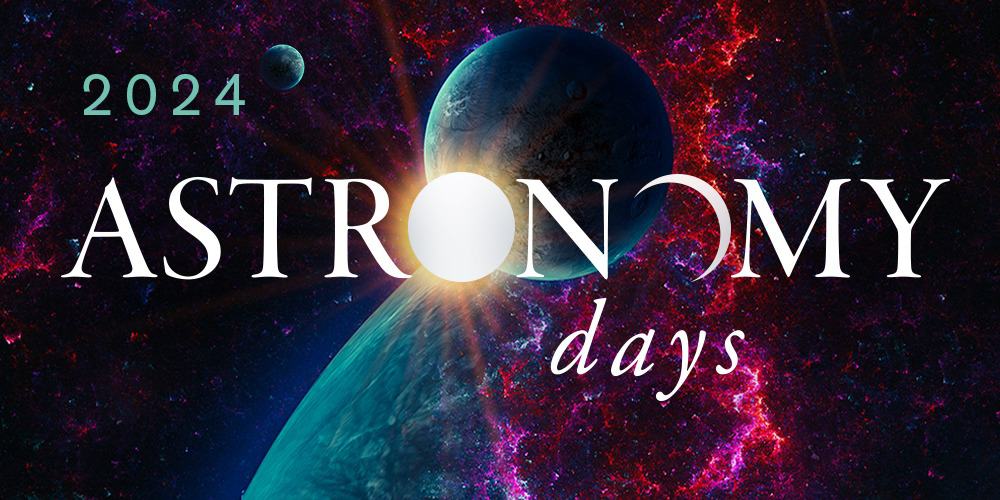North Carolina Museum of Natural Sciences’ Astronomy Days will take place February 3 and 4, 2024, from 10 a.m. to 5 p.m. each day.

The theme of Astronomy Days this years is Asteroids and meteorites.
The festival takes place at North Carolina Museum of Natural Sciences, 11 West Jones Street, Raleigh, in both Nature Exploration Center (NEC) and Nature Research Center (NRC). Outdoor activities will be located on Bicentennial Plaza.
Admission is free for everyone.
Exhibits and Activities
You can find a list of all the exhibits and events, which will be frequently updated, here.
Age, Weight and Jumping on Other Planets
Raleigh Astronomy Club
How old are you in Martian years? How much would you weigh on Venus? How high could you jump if you were on Pluto? Find out the answers to these questions and many more at this exhibit.
All About Space
Micro World Investigate Lab, NC Museum of Natural Sciences
Explore what the Solar System and space have to offer! Hours: 10:30am–12.30pm and 1pm–3pm.
Animal Navigation
NC Museum of Natural Sciences
Animals use different ways to navigate the planet. Come learn how animals find their way using the Sun, the Moon, the Earth’s magnetic field and more, and how scientists are still learning just how the animals do it!
Animals of the Constellations
NC Museum of Natural Sciences
Have you ever wondered how the constellations got their names? There are 88 constellations in the sky and many of them are named after animals! Come meet some of these critters and learn about the mythology and natural history of the animals, as well as how constellations provide a map of the night sky.
Astronomy and Astrophysics Research Lab
NC Museum of Natural Sciences
Welcome to the Museum’s Astronomy & Astrophysics Research Lab (times for lab openings will be posted during the event). The Lab showcases cutting-edge space visualization software called OpenSpace, a NASA-funded collaboration led by the American Museum of Natural History, in New York. Visitors will see the latest research from Museum astronomers Dr. Rachel Smith and Dr. Patrick Treuthardt, as well as Solar System and planetary fly-throughs using real mission data created using an open-source educational tool! Dr. Smith and Dr. Treuthardt, along with colleagues and students, will be circulating during the event and may discuss their research and outreach with visitors as well!
Astronomy Days T-Shirt Sales
NC Museum of Natural Sciences
Purchase this year’s shirt!
Astronomy with Binoculars
Raleigh Astronomy Club
View a display of low-cost astronomy equipment for Astrophotography.
Astrophotography
Raleigh Astronomy Club
Come view excellent examples of astronomy photos taken by members of the Raleigh Astronomy Club. Examples of astrophotography gear will be exhibited and members will be available to discuss techniques and processes.
Blast-Off Rockets
NC Museum of Natural Sciences
Create a rocket masterpiece and launch it sky high!
Bring Back the Night Sky
NC Museum of Natural Sciences
Light pollution affects all of us on the planet, from astronomers to sea turtles. Find out about this environmental issue and what you can do to help bring back the night sky!
CHAOS
Chapel Hill Astronomy and Observational Society
Club members range from precocious teenagers to UNC astronomy professors but most are just enthusiastic amateur astronomers. Stop by and meet them and see what they’re up to.
Constellation Exploration
NC Museum of Natural Sciences
Learn about the history and uses of constellations and then use a flashlight to head out into “space” to track down some constellations right here in the Museum!
Craters and How They Are Formed
NC Museum of Natural Sciences
Learn the “hole” story! From the surface of Earth, to the Moon and other celestial bodies, discover the origin, speed and size of the meteors that caused these impressive pockmarks throughout the universe!
Discovery Room
NC Museum of Natural Sciences
Explore the natural world and the skies above in the Discovery Room! The Discovery Room is an ideal space for intergenerational learning for children and families. Hours: 10:30am–12:30pm and 1pm–3pm.
Drive a Lunar Rover on the Moon
Cardinal Gibbons High School Robotics Team
Embark on an extraterrestrial adventure as you navigate a lunar rover across the vast expanse of our celestial neighbor on a giant Moon map. Receive complimentary patches and driver’s licenses as souvenirs to commemorate your out-of-this-world journey.
Dry Ice Comets
NC Museum of Natural Sciences
Watch astronomers use everyday supplies to make an out-of-the-world comet. Learn a little about the history of comets and their importance to life here on Earth. Demos will be held at 11:30am and 2:30pm on Saturday and Sunday.
Exoplanets
Raleigh Astronomy Club
Learn about the methods used for detecting exoplanets and see some models of exoplanets. The club will use their own version of the Kepler Space Telescope; a Lego orrery and artificial star to demonstrate the transit method of detecting exoplanets. Visitors can also learn about the Drake equation and input their own variables to see how many other communicating civilizations might be in our galaxy. They’ll also have a video illustrating the Fermi paradox.
Finding the North Star and Others
Raleigh Astronomy Club
A very kid-friendly and beginner-friendly exhibit of how to find the North Star (Polaris) and others, and why the sky moves the way it does. Based on books by H.A. Rey, who was also the author of the Curious George books.
Green Roof Solar Observing
Astronomy and Astrophysics Research Lab, NC Museum of Natural Sciences
See our star up close at Astronomy Days! Astronomers will set up solar telescopes on the 4th floor terrace of the Nature Research Center to safely view the Sun with special filters. You’ll see fascinating solar surface features like plasma loops and possibly a few sunspots! Scientists and experienced volunteers will be on hand to explain and answer questions. This activity will run from 1:00pm–2:30pm both days, weather permitting.
High Powered Rocketry Club at NC State University
High Powered Rocketry Club
Learn about the hobby of High Powered Rocketry and how we use real world rocket science and build your own straw rockets for launching.
If Earth Were the Size of the SECU Daily Planet
Raleigh Astronomy Club
How high is Mount Everest? How deep are the oceans? How thick are tectonic plates? You’ll find the answers to all these questions and more much as the club uses the Museum’s giant globe as a scale model of Earth.
Interesting Physics Demonstrations
NC State University Physics Department
Space is all about physics. Come see interesting and interactive physics demonstrations!
Lights Out
Wake Audubon Society
Lights Out is an effort to encourage government, commercial and residential buildings to turn off outside lights and shield inside lights from 11pm to 6am during the peak bird migration periods. (September 15 to November 30, and March 15 to May 31.) Birds become disoriented by artificial lights.
Living Conservatory
NC Museum of Natural Sciences
Open for Astronomy Days!
Lunar Landers and Mars Rovers Maker Station
NC Museum of Natural Sciences
Can you create an amazing robot or spaceship from found materials? Try your hand at creating your own special machine or recreate a model of the lunar lander or Mars rover!
Meet the Raleigh Astronomy Club & Ask the Astronomer
Raleigh Astronomy Club
Meet Raleigh Astronomy Club members, learn about how the club supports astronomy in the greater Raleigh area, check out upcoming events and the Ask an Astronomer booth. An interactive speed of light exhibit will also be on display.
Moonbear’s Shadow
NC Museum of Natural Sciences
Adhere to the laws of space and time by participating in this hands-on activity designed primarily for young visitors and their families. Participants move a flashlight around an object to make and experiment with shadows. Explore a storybook about a little bear exploring his own shadow’s connections to the geometry of a solar eclipse as the Moon and Sun cast a shadow onto Earth.
NC Near Space
NC Near Space Research
NC Near Space Research is group of local hobbyists that fly large weather balloons to 25 miles above the earth. This is far above aircraft, weather, and breathable air; where the sky is dark even in the daytime.
Scale of the Universe
Raleigh Astronomy Club
This interactive exhibit created by two high-school-aged brothers will allow you explore the scale of our universe from the smallest theoretical scales (the Planck length, 1.6 x 10-35 meters) to the largest distances of the observable universe (1028 meters) and everything in between.
Scribble Machines
NC Museum of Natural Sciences
Make spectacular robot art and give your engineering skills a jump start at this station, where you can learn how to build your own scribble machine and about the mechanisms used to create Mars rovers!
Solar Observing
Raleigh Astronomy Club
Safely look at the Sun through telescopes from Raleigh Astronomy Club members (weather permitting).
Space in Your Hands with PARI
Pisgah Astronomical Research Institute
PARI will be bringing a variety of meteorites from our collection for visitors to touch and hold, as well as 3D printing scale models of meteorite impact craters from places like the Moon and Mars live for you to watch. You can also learn to remote control one of our radio telescopes and see the signals from super nova remnants! We will share information about our Space Exploration Summer Camps and available scholarships.
Sun, Earth, Moon Craft
NC Museum of Natural Sciences
Get ready for the 2024 solar eclipse by making a model of the Earth, the Sun and the Moon. Learn why the positions of these objects make the Earth so special and its residents able to see a spectacular show!
Telescopes on Display
Raleigh Astronomy Club
Come look at photographic views of the Moon and planets through member-owned telescopes. Accept the “challenge at the eyepiece” to locate specific features on the Moon. See different types of telescopes at work.
Accessibility for Astronomy Days
The festival will include both indoor and outdoor activities. Indoor activities will be located in the Nature Exploration Center (NEC) and Nature Research Center (NRC). Outdoor activities are limited and will be located on Bicentennial Plaza.
We will have trained volunteers to assist visitors (2 hours maximum). Visitors will need to preregister for sighted guides by Friday, January 27.
Please register for a sighted guide by calling Kari Wouk at 919.707.9879 or emailing her at kari.wouk@naturalsciences.org. Please provide your first and last name and the time period for which you will need a sighted guide.
You may request an ASL interpreter for certain exhibits and presentations by calling Kari Wouk at 919.707.9879 or emailing her at kari.wouk@naturalsciences.org no later than Friday, January 20.
More information on accessibility.
Double-Check Before You Head Out!
We make every effort to make sure that everything on Triangle on the Cheap is 100% accurate.
However, sometimes things change without notice, and it’s also possible that we can make a mistake.
Please verify all deals and events with the venue or organizer before you go.
More Events
Check out our list of free and cheap events in Raleigh and the rest of the Triangle this weekend, or our full event calendar in the Triangle, or just look at few upcoming events here:
North Carolina Museum of Natural Sciences, Raleigh
11 W Jones St
Raleigh, NC

